Just In
- 1 hr ago

- 1 hr ago

- 5 hrs ago

- 11 hrs ago

Don't Miss
- Movies
 Chief Detective 1958 Episode 2 OTT Release Date, Time, Platform: When & Where To Watch? What To Expect? DEETS
Chief Detective 1958 Episode 2 OTT Release Date, Time, Platform: When & Where To Watch? What To Expect? DEETS - Sports
 IPL 2024: LSG vs CSK Award Winners, Man of The Match, Post-Match Presentation, Scorecard & Records
IPL 2024: LSG vs CSK Award Winners, Man of The Match, Post-Match Presentation, Scorecard & Records - News
 Chinese President Xi Jinping Orders Biggest Military Reorganisation Since 2015
Chinese President Xi Jinping Orders Biggest Military Reorganisation Since 2015 - Education
 Exam Pressure Does Not Exist; Studying Punctually is Crucial; Says Aditi, the PSEB 2024 Topper
Exam Pressure Does Not Exist; Studying Punctually is Crucial; Says Aditi, the PSEB 2024 Topper - Finance
 Reliance, ONGC, Tata, Adanis: Energy Stocks Didn't Get The Memo Of Bears, Up 12% In 30-Days; 10 Stocks To BUY
Reliance, ONGC, Tata, Adanis: Energy Stocks Didn't Get The Memo Of Bears, Up 12% In 30-Days; 10 Stocks To BUY - Automobiles
 Suzuki Swift Hatchback Scores 4 Star Safety Rating At JNCAP – ADAS, New Engine & More
Suzuki Swift Hatchback Scores 4 Star Safety Rating At JNCAP – ADAS, New Engine & More - Technology
 Dell Introduces AI-Powered Laptops and Mobile Workstations for Enterprises in India
Dell Introduces AI-Powered Laptops and Mobile Workstations for Enterprises in India - Travel
 Journey From Delhi To Ooty: Top Transport Options And Attractions
Journey From Delhi To Ooty: Top Transport Options And Attractions
Do You Know These 10 Myths About Depression?
Every decade has its own trials and tribulations. And opening up about mental health and its disorders is one of the social concerns of this decade.
In fact, according to a WHO statistic, over 350 million people around the world suffer from depression.
That's a big number!
But just like every other taboo topic, mental health disorders also have their fair share of myths.
So, here are 10 of the most insidious myths about depression, plus the fact that counters these myths.
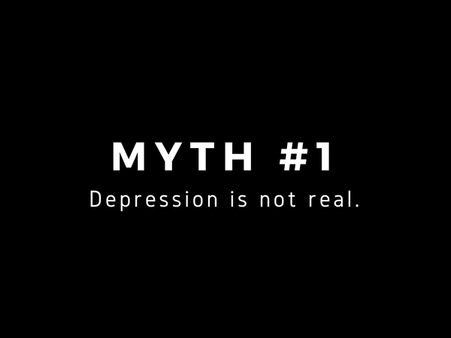
Myth #1: Depression Is Not A Real Disorder
It's alarming how many people think depression is merely an extreme form of sadness that the suffering individual can get out of if he/she just becomes more optimistic.
In fact, a lot of people accuse those suffering from depression of intentionally remaining in their dark state of sadness.
The fact is: Depression is a serious mental illness characterized by an illogical feeling that nothing will ever be right in the world and with the person suffering from it.
In fact, depressed individuals can get so severely trapped in this negative spiral that they can forgo eating, getting out of bed, and maintaining general hygiene for months or years on end.

Myth #2: You Can Cure Depression With Anti-depressants
Anti-depressants were at one point the only way to "cure" depression. But an increasing number of researches are coming out with findings which prove that popping anti-depressants may be like putting a band-aid over a bullet wound.
Why? Because these drugs alter your mental state and make you drowsy, thus handicapping you throughout the day.
The fact is: Depression does not have a viable cure yet and most people suffering from it usually have more than one depression episode in their life even after recovering from their state.
Nevertheless, science is progressing at a fast rate, and currently, we have many treatment modalities for depression, including cognitive behavioural therapy and serotonin-rich diet.
Anti-depressants just happen to be one such modality, and that too for depressed people who frequently have suicidal thoughts.
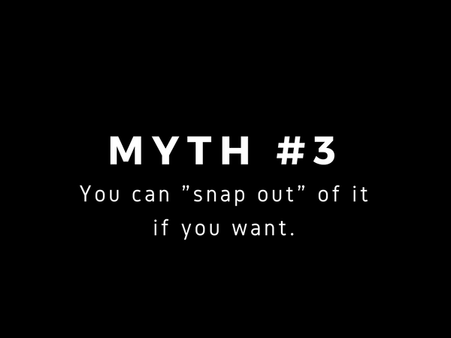
Myth #3: You Can “Snap Out” Of Your Depression If You Want To
As explained in myth #1, a lot of people think depression is just sadness that the patient can "snap out" of if they were inclined.
Unfortunately, depression is not as black and white as regular human sadness.
The fact is: Most people suffering from depression have other mental or personality disorders, like bipolar disorder or borderline personality disorder. And there is no way you can "snap out" of it, unless you receive the medical help you need.
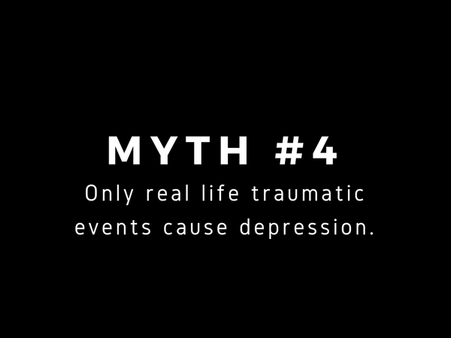
Myth #4: You Become Depressed After A Traumatic Incident In Your Life
While the risk of getting depressed is quite high when something really bad happens in your life, like the death of a parent, a beloved pet, or even the loss of your livelihood, that's not the case all the time.
The fact is: People do get depressed out of the blue.
In fact, bipolar individuals are known to get depressed rapidly after an episode of mania where they feel invincible and top of the world!

Myth #5: Women Suffer From Depression More Than Men
That's a social myth propagated because men often avoid telling people that they need help, until they are standing at the precipice of the problem.
The fact is: Men and women are equally likely to get depressed; but women are more likely to cry out for help.
This is an unfortunate truth and the only way to counter this negative myth is through teaching your sons to be more open about their emotions and ask for help when they need it because these are the signs of a man confident about his masculinity.
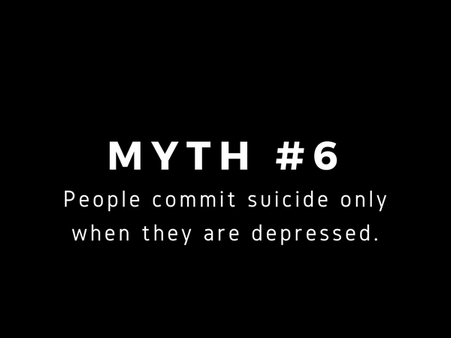
Myth #6: People Who Commit Suicide Are Always Depressed
That's not true.
Most people who commit suicide are not depressed but are suffering from intense crises in their life, like crash of the stock market, alcoholism, and rejection in love affairs.
The fact is: Only severe depression induces suicidal thoughts in people. And most only commit it if it's easy to do, since depression makes people lethargic and incapable of even leaving their bed.
Nevertheless, if you are depressed and are having suicidal thoughts, please get psychiatric help fast. Your life is not worth gambling with on the off chance that you will be too tired to kill yourself.

Myth #7: People In Poorer Countries Are More Depressed
Not true!
Why? Because statistically speaking, people from wealthier countries are known to suffer from depression more than their poorer counterparts.
In fact, the United States, Russia, France, and Japan have one of the highest rates of depression anywhere in the world.
The fact is: Most people in developing countries do not suffer from depression, since their social structure is such that people are closely bonded to each other, which prevents loneliness and illogical thinking from triggering a depressive episode.
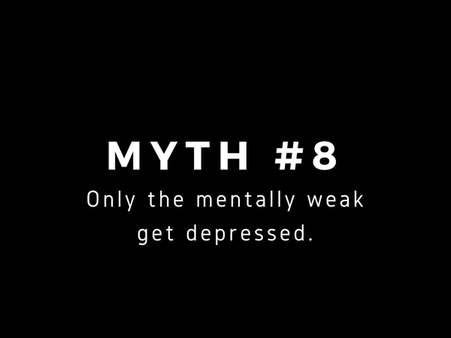
Myth #8: People Who Get Depressed Are Mentally Weak
Wrong!
Historically speaking, intellectually brilliant people are more likely to be depressed, as they are more attuned with the harsh realities of the world.
In fact, Abraham Lincoln, Sylvia Plath, and Franz Kafka are some famous examples of geniuses who battled depression throughout their life. And the modern world is full of such examples as well, like Lilly Singh and Deepika Padukone.
The fact is: Smarter people tend to suffer from more mental disorders, including depression. And those who seek out help for it are more mentally resilient.
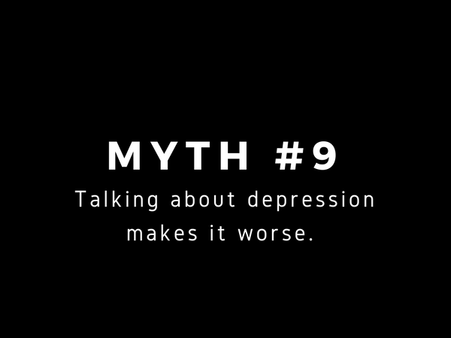
Myth #9: Talking About It Will Make It Worse
This myth is a result of severe social stigma against opening up about mental health issues (as if your brain is not a part of your body!).
But, in reality, those who talk about their depression are more likely to overcome it than those who keep mum.
The fact is: Depressed people, like those suffering from other health disorders, require a lot of support from their loved ones, so they do not end up hiding their symptoms, or worse, committing suicide.
And talking about this state can help tremendously, as the listener can point out the illogical thought patterns of the depressed person, thus helping them slowly come out of their negative spiral.
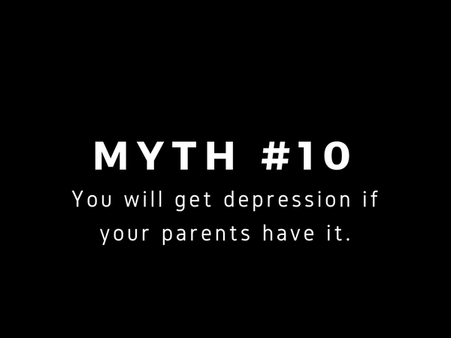
Myth #10: If Your Parents Have It, You Will Too
Recent studies have shown that though there is a 10%-15% chance that children of depressed parents will become depressed as well later in life, in most cases, the genetic predisposition to depression is a more circumstantial link than real.
The fact is: Whether you become depressed or not is largely dependent on your environment. That's why those who have strong bonds with their friends and family and feel supported and loved often do not develop depression, while their less emotionally fortunate counterparts do.
Share This Article!
Help us get rid of the social taboo surrounding mental health problems. Share this article, so your friends can read it too and be aware.

-
 wellnessInternational Men’s Day 2023: 5 Mental Health Issues Often Ignored In Men
wellnessInternational Men’s Day 2023: 5 Mental Health Issues Often Ignored In Men -
 healthGlenn Maxwell's Triumph Over Depression With His Wife By His Side: Can Your Partner Be The Saving Grace?
healthGlenn Maxwell's Triumph Over Depression With His Wife By His Side: Can Your Partner Be The Saving Grace? -
 healthMonsoon Continues In Many Parts Of India: Can Rain Trigger Depression?
healthMonsoon Continues In Many Parts Of India: Can Rain Trigger Depression? -
 pregnancy parentingObesity And Depression: 5 Ways You Can Support Your Kid
pregnancy parentingObesity And Depression: 5 Ways You Can Support Your Kid -
 wellnessWorld Mental Health Day: Tips To Deal With Morning Anxiety Before Work
wellnessWorld Mental Health Day: Tips To Deal With Morning Anxiety Before Work -
 health5 Things To Try In Addition To Therapy For Mental Health Illnesses
health5 Things To Try In Addition To Therapy For Mental Health Illnesses -
 healthNegative Thinking Disorder: How To Suppress Negative Thoughts To Improve Your Mental Health?
healthNegative Thinking Disorder: How To Suppress Negative Thoughts To Improve Your Mental Health? -
 healthYour Food Can Trigger Depression, Are You At Risk? 5 Foods You Should Be Wary Of
healthYour Food Can Trigger Depression, Are You At Risk? 5 Foods You Should Be Wary Of -
 healthMental Health: Sudden Anxiety Attack? Top 5 Ways To Find Instant Relief
healthMental Health: Sudden Anxiety Attack? Top 5 Ways To Find Instant Relief -
 pregnancy parentingMental Health: Teenage Blues Or Depression? Recognising Depression Symptoms In Teens
pregnancy parentingMental Health: Teenage Blues Or Depression? Recognising Depression Symptoms In Teens -
 healthUnlock the Magical Stress-Busting Power of Indian Spices and Herbs
healthUnlock the Magical Stress-Busting Power of Indian Spices and Herbs -
 healthMyths vs Facts: Are Schizophrenics Violent?
healthMyths vs Facts: Are Schizophrenics Violent?


 Click it and Unblock the Notifications
Click it and Unblock the Notifications



